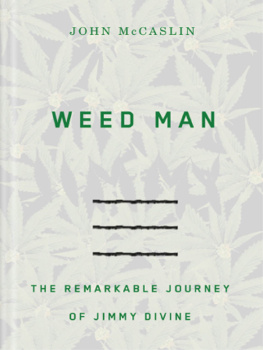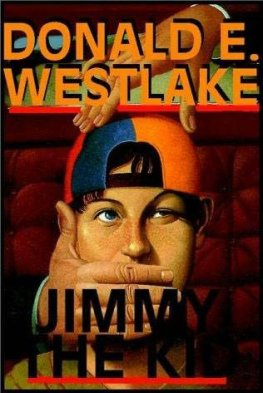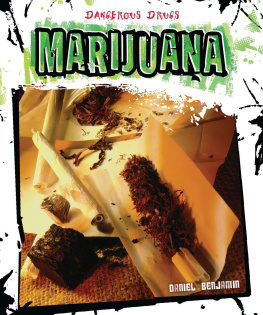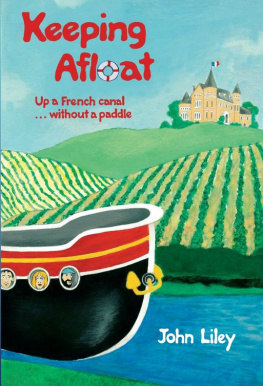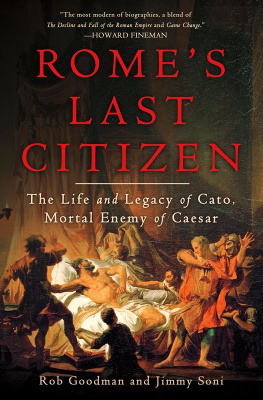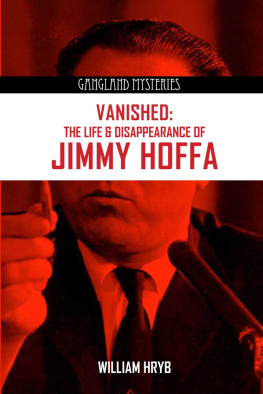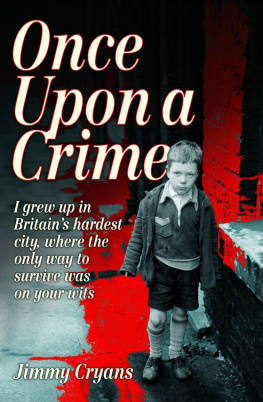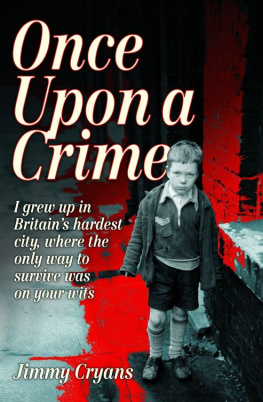Praise for
Weed Man
This reads like a bestseller. Its about time we hear from a genuine pot smuggler of Jimmy Divines caliber who opens our eyes to the high times and high jinks on the high seas.
Tommy Chong,
comedian and actor
of Cheech & Chong fame
McCaslin was a 20-something White House correspondent covering my dad, Ronald Reagan, when I first read his unique musings. Maybe Im not surprised, given the cast of characters and shenanigans he calls attention to every day in his Inside the Beltway column, that hes now somehow made his way to a distant tropical island and uncovered the colorful if not hilarious escapades of drug trafficker Jimmy Divine.
Michael Reagan,
presidential son and nationally
syndicated radio host
Facts are easy. Anyone can find facts for a story. What McCaslin always finds is heart.
Brad Meltzer,
author of New York Times best-selling
mystery/suspense novels The Tenth
Justice, Dead Even, The First Counsel,
The Millionaires, The Zero Game,
The Book of Fate, The Book of Lies
This story is so compelling... John McCaslin has put it all together in a way that simply made me want to just keep on reading. Wow.
Wolf Blitzer,
anchor, host of CNNs
The Situation Room
For years everybody in Washington has turned to John McCaslins Inside The Beltway column for the inside skinny on what is going on in our nations capital. Now, in Weed Man: The Remarkable Journeyof Jimmy Divine, McCaslin brings his exceptional reportorial talent to bear in a fascinating expose of the drug trade.
G. Gordon Liddy,
Watergate figure and nationally
syndicated radio host
Im delighted to see that John McCaslin has climbed out of his political trench in Washington long enough to set sail on this astonishing journey through the precarious Caribbean reefs, and beyond. Somehow, in typical McCaslin fashion, he manages to bring his readers back to the nations capital in a chapter that will certainly have official tongues wagging in Washington.
Katie Couric,
anchor and managing editor
of the CBS Evening News and former
co-host of NBCs Today
Proof positive that the extras in James Bond movies are far more interesting than the films, the story of Harbour Islands Jimmy Divine is so colorful it is hard to believe... or put down. Told in a breezy, witty style, McCaslins book captures moments in relatively recent Caribbean history when it was again possible to make a fortune by the ability to steer a boat stealthily through dangerous seas.
Mark Bowden,
author of Black Hawk Down,
Guests of the Ayatollah and Killing Pablo
Weed Man
Also by John McCaslin
Inside the Beltway: Offbeat Stories, Scoops, and Shenanigans
from Around the Nations Capital

2009 by John McCaslin
All rights reserved. No portion of this book may be reproduced, stored in a retrieval system, or transmitted in any form or by any meanselectronic, mechanical, photocopy, recording, scanning, or otherexcept for brief quotations in critical reviews or articles, without the prior written permission of the publisher.
Published in Nashville, Tennessee, by Thomas Nelson. Thomas Nelson is a registered trademark of Thomas Nelson, Inc.
Thomas Nelson, Inc., titles may be purchased in bulk for educational, business, fundraising, or sales promotional use. For information, please e-mail SpecialMarkets@ThomasNelson.com.
Library of Congress Cataloging-in-Publication Data
McCaslin, John.
Weed man : the remarkable journey of Jimmy Divine / John McCaslin.
p. cm.
Includes bibliographical references.
ISBN 978-1-59555-153-5 (hbk.)
1. Moree, Jimmy, 1952- 2. Drug couriersCaribbean AreaBiography.
3. Drug trafficCaribbean Area. 4. Drug trafficUnited States. 5. Marijuana industryCaribbean Area. I. Title
HV5805.M67M33 2008
363.45092dc22
[B]
2008054290
Printed in the United States of America
09 10 11 12 13 QW 5 4 3 2 1
CONTENTS
FOR LANE AND FINNEAS AND THEIR CREW
ON HARBOUR ISLAND
THIS BOOK IS BASED ON A TRUE STORY TOLD FOR THE first time by Jimmy Moree, who lives on a tiny Bahamian island accessible only by boat. Several of the storys characters are identified by their actual names or by nicknames. Identities of others have been changed to protect the guilty.
JOHN MCCASLIN
Washington, D.C.
October 2008
THE SUN-BAKED BOTTLE OF KALIK SPEWS SUDS AS Robert Arthurs golf cart, the primary mode of transportation on tiny Harbour Islandspoken Briland by the localsbounces along a rough road called Coconut Grove, past the sand dance floor of Gustys Bar, and onto a crater-filled path leading to the Narrows, a secluded stretch of paradise where some of the worlds wealthiest people try to avoid the rest of us.
Youll enjoy meeting the couple, Robert says as I suck the foam from the beer neck. Jimmys Bahamiana white Bahamianand Hannah is Canadian. There arent two nicer people on the island.
That was all the tri-tiered baker/Realtor/minister bothered to say beforehand about the Morees (pronounced Mor-ease), although I knew Robert ran with good company. Before he began glazing donuts, peddling properties, and preaching Gods Word every Sunday, Tuesday, and Thursday in his Kingdom Hall (attached to Arthurs Bakery) of Jehovahs Witnesses, the handsome black Bahamian had worked in broadcast journalism, as I did early in my career. During the 1970s he was splicing tape in the same studio where a budding broadcaster named Lawrence Zieger, better known today as Larry King, hosted a local talk show over Miami television station WTVJ. Like Larry, Robert would rise to become a star in his own right, blessed with one of those one-in-a-million success stories in TV and film, as he describes it. Now hes come back home to this charming speck of coral floating off the northeast coast of Eleuthera his ancestors helped settle centuries ago.
Indeed, despite being raked by an untold number of hurricanes, Harbour Islands colonial-era homes still stand today, lathered in tropical shades of pink, green, and blue long before Lilly Lee Pulitzer painted her house a watermelon sorbet. One 1935 visitor to the island, Nora Benjamin, described a storybook setting for Nassau Literary Magazine: We found ourselves facing a perfect model of a town, a candy box of a town. There was a coffee-colored house with raspberry shutters; a lemon house with chocolate shutters; a strawberry mousse mansion on the hill all decorated with white sugar icing. Spotless paved streets and walks ran between gardens flaming with bougainvillea and hibiscus.
Today, the narrow lanes bordered by salt-bleached fences and pargeted walls still bear allegiance to the British crown: King, Queen, Princess, and Pitt, to name a few of the streets. In other words, little has changed on the three-mile-long island since the last of the redcoats surrendered the thirteen colonies, and the loyalist governor of Virginia fled to this very cay, where he ceremoniously crowned himself Lord Dunmore.
Ironically, of all the West Indies in the California-sized archipelago to choose from, Lord Dunmore evacuated to one inhabited by a religious flock that first landed in 1647 to escape persecution in England. He immediately ordered their subsequent generations expelled, and only then was he able to christen the British Empires newest capitalwhat else? Dunmore Town.
In fact, after he baked his final dozen donuts one day, Robert put on his real estate hat and arranged for my family to buy a two-hundred-year-old colonialpink with blue-green shuttersdirectly next door to the original site of Lord Dunmores cottage on Crown Street.
Next page
